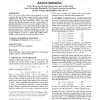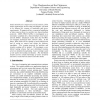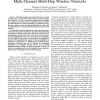485 search results - page 88 / 97 » Power Mode Scheduling for Ad Hoc Networks |
JUCS
2006
13 years 9 months ago
2006
Abstract: In ad-hoc networks, mobile devices communicate via wireless links without the aid of any fixed networking infrastructure. These devices must be able to discover services ...
PEWASUN
2004
ACM
14 years 2 months ago
2004
ACM
Interferences in an ad-hoc network can be defined as a set of constraints that specify which groups of nodes cannot transmit simultaneously, and they have significant implications...
LCN
2002
IEEE
14 years 2 months ago
2002
IEEE
Sensor networks are a major new area of research. Some sensor applications, such as video surveillance, will need to be tethered for reasons of bandwidth and power requirements. T...
OPODIS
2010
13 years 7 months ago
2010
Abstract. Wireless Ad-hoc networks are distributed systems that often reside in error-prone environments. Self-stabilization lets the system recover autonomously from an arbitrary ...
ICC
2009
IEEE
13 years 7 months ago
2009
IEEE
Typically, topology control is perceived as a per-node transmit power control process that achieves certain networklevel objectives. We take an alternative approach of controlling ...



